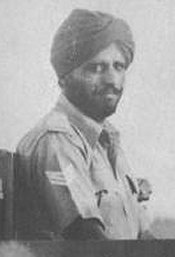Parkash Singh facts for kids
Quick facts for kids
Parkash Singh
|
|
|---|---|

Havildar Parkash Singh, VC, 8th Punjab Regiment.
|
|
| Born | 31 March 1913 Lyallpur District, British India |
| Died | 23 March 1991 (aged 77) Ealing, London |
| Allegiance | |
| Service/ |
|
| Years of service | 1936-1968 |
| Rank | Jemadar (British Indian Army) Major (Indian Army) |
| Service number | 14696 (enlisted) SS-14772 (short-service commission) IC-6070 (regular commission) |
| Unit | 8th Punjab Regiment Sikh Regiment |
| Battles/wars | Waziristan Campaign World War II |
| Awards | |
Major Parkash Singh VC (31 March 1913 – 23 March 1991) was a very brave Sikh soldier from India. He received the Victoria Cross, which is the highest and most important award for bravery in battle. This award can be given to soldiers from British and Commonwealth forces.
Contents
Life of a Hero
Parkash Singh was born on March 31, 1913. His village, Sharikar, was in the Lyallpur District of what was then British India. Today, this area is part of Pakistan. He came from a Jat Sikh family.
Joining the Army
Parkash Singh joined the 8th Punjab Regiment of the British Indian Army on November 21, 1936. Before World War II, he served in an area called the North-West Frontier.
Bravery in World War II
During the Second World War, Parkash Singh was a 28-year-old soldier called a Havildar. He was part of a special unit that used vehicles called Bren Gun Carriers. These were small, armored vehicles that carried machine guns.
In January 1943, his battalion was fighting against Japanese forces in Burma. This is where he showed incredible courage.
Saving His Comrades
On January 6, 1943, Parkash Singh's unit was attacked by a strong Japanese patrol. His commander was hurt and had to leave, so Parkash Singh took charge.
He quickly saw two other Bren Gun Carriers stuck in a ditch, under heavy Japanese fire. He rushed to help them. He told the crews to leave their vehicles and run to safety while he fired his gun to protect them.
When his own gunner was wounded, Parkash Singh took over the machine gun himself. He drove his carrier with one hand and fired the gun with the other. He bravely drove towards the enemy, forcing them to move from their positions.
Then, he went back to pick up the crews of the stuck vehicles. Even though the enemy was still firing heavily, he calmly rescued all eight men.
Another Act of Courage
A few days later, on January 19, his unit's carriers were attacked again in the same area. Several vehicles were destroyed, including his commander's. Everyone thought the crews of the destroyed vehicles were dead. The other carriers started to pull back.
But Parkash Singh wanted to check for survivors himself. He drove his vehicle down the beach, even though the enemy was firing intensely. He found his officer and his driver in their badly damaged carrier. They were too hurt to move.
So, Parkash Singh decided to tow their vehicle to safety. His commander told him to go back and save himself, but Parkash Singh refused. He quickly set up a makeshift tow chain. He attached it to the damaged carrier, all while being exposed to enemy fire. Then, he towed the vehicle and the injured men back to safety.
For these amazing acts of bravery and his selfless dedication on January 6 and 19, 1943, Havildar Parkash Singh was given the Victoria Cross.
After the War
After the war, Parkash Singh continued to serve in the Indian Army. He moved to the Sikh Regiment because his old regiment became part of the Pakistan Army. He was promoted several times, eventually becoming a Major on July 19, 1961.
He retired from the army on November 21, 1968, after serving for 32 years.
Later Life and Legacy
Major Parkash Singh passed away on March 23, 1991, at the age of 77. He was undergoing heart surgery in England, in Ealing, London. His Victoria Cross medal is now displayed at the Imperial War Museum in London, where people can see it and remember his incredible bravery.
Awards and Medals
Parkash Singh received many medals for his long and brave service. The most important one was the Victoria Cross. Here are some of the awards he received:
| Raksha Medal | |||
| Samanya Seva Medal | General Service Medal 1947 | Indian Independence Medal | Victoria Cross |
| 1939–45 Star | Burma Star | War Medal 1939-1945 | India Service Medal |
| General Service Medal (1918) | India General Service Medal (1936) | Queen Elizabeth II Coronation Medal | Queen Elizabeth II Silver Jubilee Medal |
 | John T. Biggers |
 | Thomas Blackshear |
 | Mark Bradford |
 | Beverly Buchanan |

